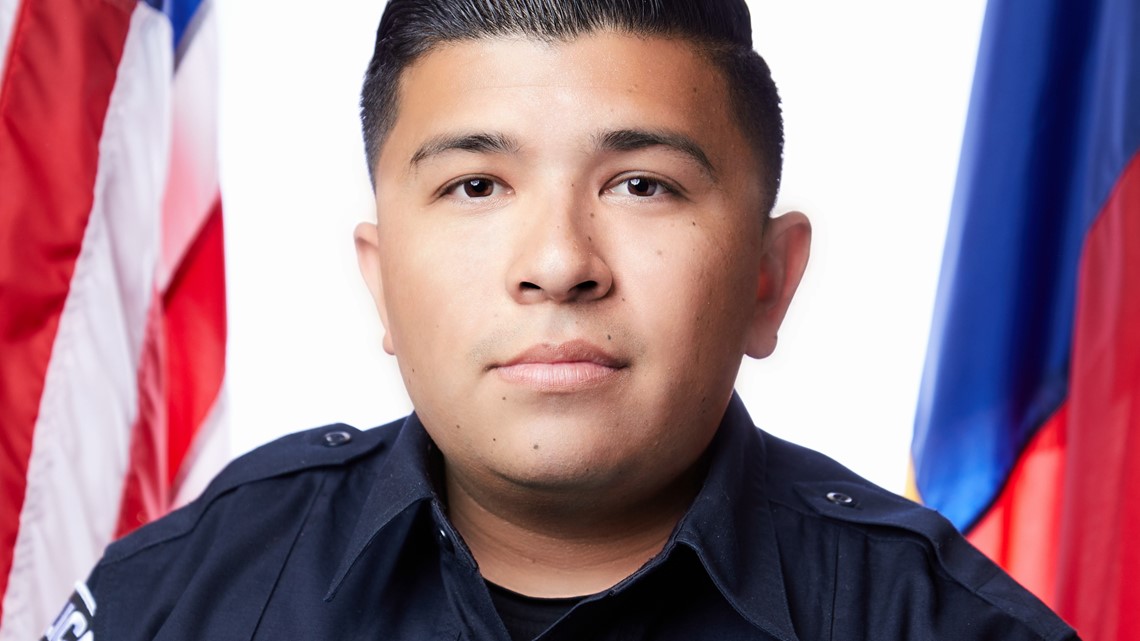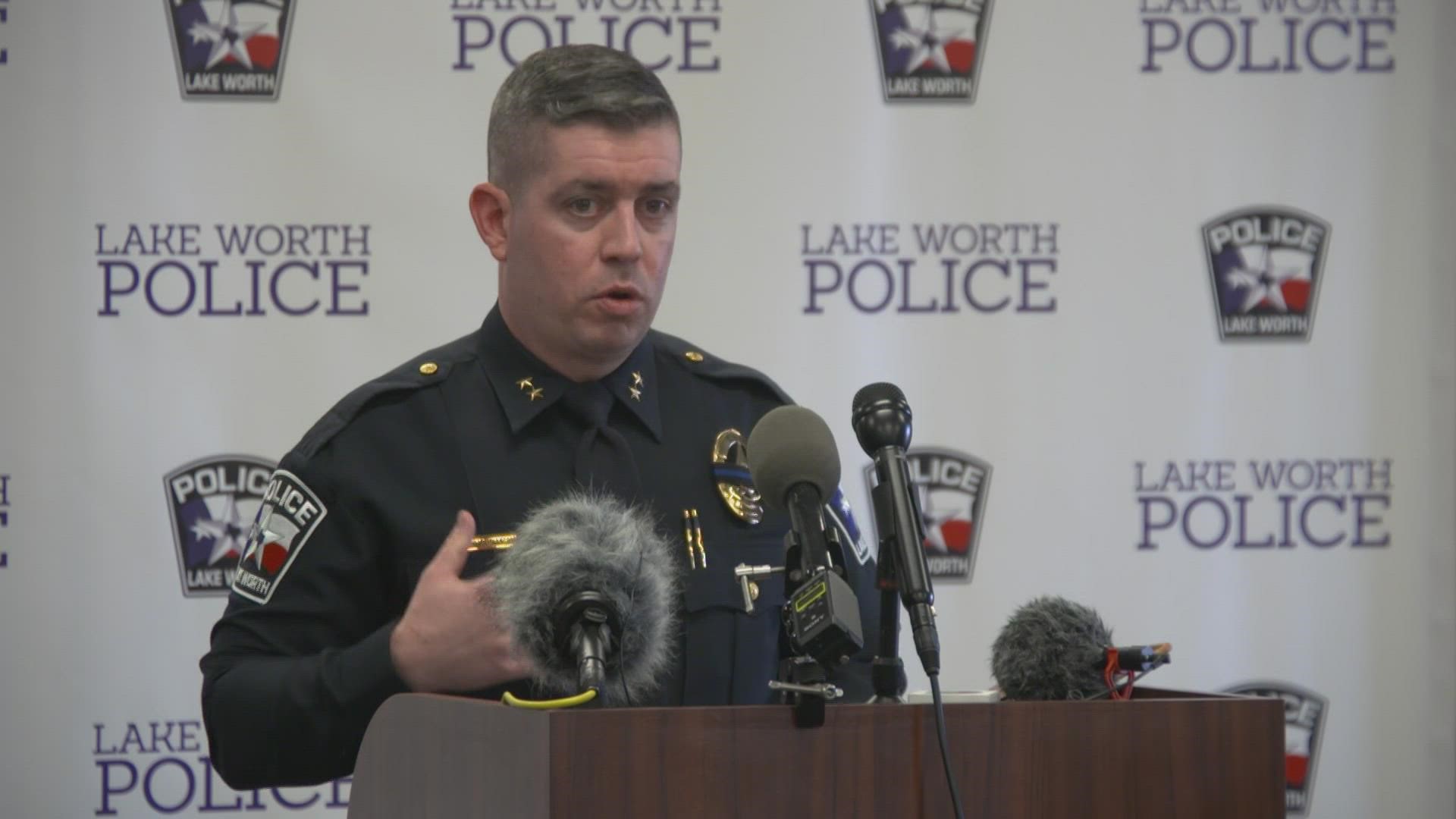LAKE WORTH, Texas — The former Lake Worth police officer who is being sued for striking a man with his patrol SUV in 2020 is the same officer who fatally shot a man on duty in September 2021, police officials confirmed on Tuesday.
Officer Jonathan Granado, who has since resigned from the department, was sued in Fort Worth federal court on Monday for hitting the man who was running across a field during a chase in November 2020.
On Tuesday, Lake Worth police Chief J.T. Manoushagian confirmed that Granado also fatally shot a man on Sept. 3 after a chase that ended in Fort Worth.
Mansoughagian in a news conference Tuesday said he decided to go public with Granado's involvement in the September shooting because "our community deserved to hear that connection from us."
Before Tuesday, Granado had not been named as the officer who shot 18-year-old Estevan Ramirez in September, and Manoushagian did not mention the connection in the news conference Monday about the lawsuit.
In the September incident, Ramirez allegedly pointed a gun at officers during a chase, officials said at the time. Granado was placed on administrative leave during the investigation, but he resigned on Dec. 1, before the case was submitted to the Tarrant County District Attorney's Office on Dec. 22.
Manoushagian said Granado, who joined the department in March 2018, resigned on his own but that it was a decision the police department supported.
The case has not yet gone to a grand jury, which will decide whether to indict Granado or not.


In the 2020 incident in which Granado hit a man with his SUV, a grand jury declined to indict him. At the department level, Manoushagian said Granado received a two-week suspension and mandatory training - a punishment that Manoushagian felt was appropriate.
"We would never have seasoned police officers if we fired them after their first mistake," Manoushagian said Tuesday. "We have all made mistakes. In this case, I believe that the officer deserved a chance to learn from it."
September shooting
In the September shooting, Lake Worth officers had tried to pull over a driver who was speeding on Loop 820 when a chase ensued and ended up in Fort worth.
A neighboring police department let the officers know the suspect was "armed and dangerous" so the officers became "on high alert," Manoushagian said.
When the vehicle tried to make a right-hand turn off Interstate 30 in Fort Worth, the driver hit a curb, blew the left front tire and caused the vehicle to start rolling.
The driver eventually pulled over, Manoushagian said.
Three men then got out of the car and started running as two Lake Worth police officers ran after them.
"Everybody bailed out," Manoushagian said in September. "Literally went all different directions."
The left rear passenger got out of the car with a firearm in his hand, according to Manoushagian. He then pointed it at one of the officers.
"The officer said out loud, 'Gun, gun, gun, he's got a gun,'" Manoushagian said.
One of the officers then shot the suspect with the gun. Police later said the officer fired six rounds.
After the man was shot, the officers when back to their police car, grabbed a trauma kit and both began performing CPR and other life-saving measures before MedStar arrived.
Only one officer, Granado, shot at the suspect, Manoushagian said.
Fort Worth police investigated the shooting. On Dec. 22, the case was submitted to the district attorney's office, according to a news release from Lake Worth police.
Lawsuit over striking man in 2020
The September shooting happened about 10 months after Granado struck a man with his patrol SUV in November 2020.
That incident -- which resulted in a federal lawsuit being filed against Granado on Monday -- happened on Nov. 23, 2020, on Lake Worth Boulevard, where Bates, on his motorcycle in the eastbound lanes, came to a stop at a red light at Boat Club Road.
Manoushagian said Granado pulled behind Bates in his patrol SUV, but Granado said that he could not see Bates' license plate. The lawsuit alleged Granado then gave the license plate number to dispatch.
Manoushagian said Granado attempted a traffic stop but Bates sped off, leading to a pursuit. The chase continued to eastbound Loop 820, and then Bates exited at Marine Creek Parkway.
When Bates left the freeway, he drove into a grass median on the off ramp and lost control of his motorcycle, Manoushagian said.
Bates slid off the motorcycle and into a grassy area. He then ran into a grass field across from the exit ramp "in an effort to get out of [Granado's] way as he saw [Granado] approaching at a high rate of speed," the lawsuit said.
Dashcam footage included in the lawsuit showed Bates running across the freeway exit ramp, toward the field.
As Bates ran across the road, Manoushagian said Granado veered off the roadway as he tracked Bates with his eyes. The chief said the officer applied his brakes while on a grassy area but that the SUV began to "slide" due to moisture on the grass.
"The officer continued to apply the brakes and continued sliding until he collided with Mr. Bates," Manoushagian said during the news conference.
The dashcam footage also showed Granado's SUV turning off the roadway, with Bates running in the grass.
The lawsuit alleged that Granado "had now driven his SUV directly toward Mr. Bates so that Mr. Bates was centered in front of the [Granado's] SUV."
Manoushagian said after the incident that the Grand Prairie Police Department was called to conduct an "unbiased" investigation. Grand Prairie police investigated for any possible criminal charges, according to Manoushagian.
Manoushagian said he did not consider the fact that Granado used to work as a corrections officer for Grand Prairie PD as a conflict of interest.
The Lake Worth Police Department also conducted an internal investigation, according to Manoushagian.
Manoushagian said investigators determined that Granado was driving about 45 mph when he hit Bates. Prior to the collision, Manoushagian said the officer was driving at about 95 mph when he took the exit ramp and started braking to around 84 mph and then about 74 mph before he went off the roadway. A combination of the brakes and grassy area had initially slowed him to 51 mph, according to Manoushagian.
When asked about his reaction to seeing the video footage, Manoushagian said, "My heart sank. What I saw in the video is not in keeping with the actions we expect our officers to take... in this case we caused injury to someone, and it was due to the officer's poor judgment."
But, the lawsuit alleged Granado's SUV "was not sliding through the grass out of control, but instead, drove in a clear curve directly into Mr. Bates under [Granado's] control the entire time," citing photos of Granado's tire tracks.
The lawsuit claimed that on the dashcam footage, Granado's brakes could be heard only after he struck Bates.
In both incidents involving Granado, Lake Worth police "took the exact same path," Manoushagian said, investigating both at an administrative level, placing Granado on leave and referring the case to the district attorney's office.
"We tried to treat these two incidents as separate incidents," Manoushagian said. said. "We believe in procedural justice for our officer. We're trying to treat each case on a case by case basis."

